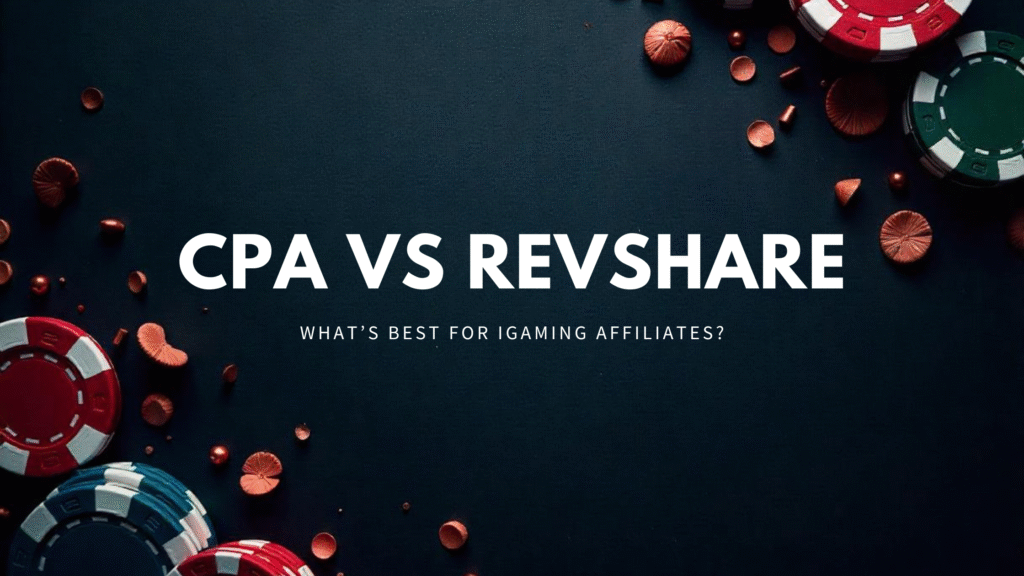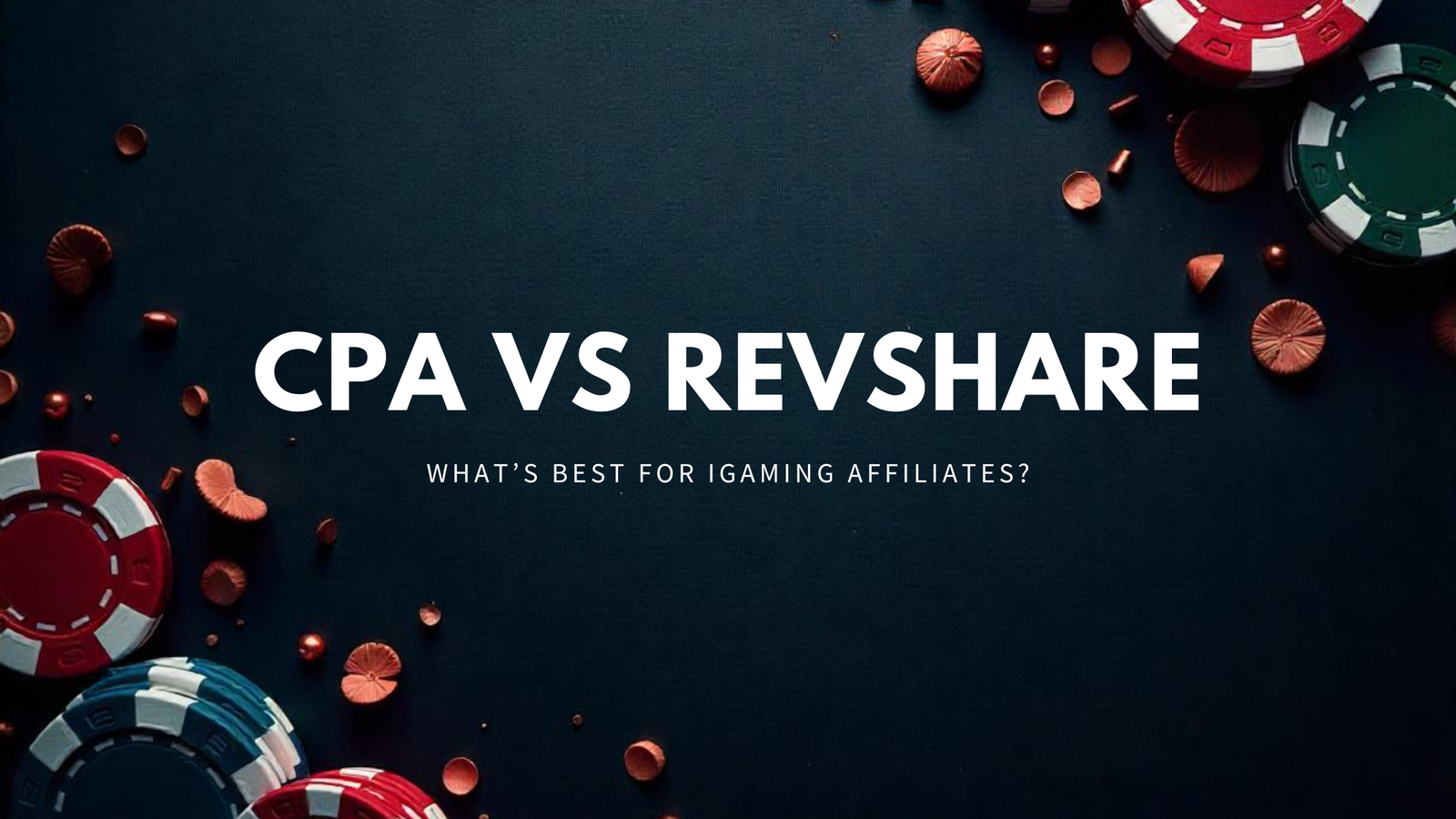
When it comes to iGaming affiliate marketing, choosing the right payment model is crucial to long-term success. The two most popular compensation structures are CPA (Cost Per Acquisition) and Revenue Share. But which one is better for you as an affiliate?
In this article, we’ll break down the pros and cons of both models, help you understand how each one works, and guide you on how to choose the right one based on your audience, traffic, and business goals.
What Is CPA in iGaming Affiliate Marketing?
CPA stands for Cost Per Acquisition. Under this model, affiliates earn a fixed one-time payment for every new depositing player (FDP) they refer to an operator.
Example:
If your CPA deal is $150 and you refer 10 players this month, you earn $1,500, regardless of how much those players wager in the future.
Pros of CPA:
- Fast cash flow: Immediate payouts per user.
- Predictable income (especially with high-volume traffic).
- Low risk of long-term negative revenue.
Cons of CPA:
- No ongoing income from referred players.
- Requires consistent high traffic to scale.
- Strict qualification criteria (e.g., deposit amount, KYC completion).
What Is Revenue Share in iGaming?
Revenue Share (RevShare) means you earn a percentage of the net revenue generated by the players you refer — typically between 25% and 40%.
Example:
If a referred player loses $500 over a month and your RevShare is 30%, you earn $150 from that player for that month — and continue earning as long as they keep playing.
Pros of Revenue Share:
- Passive income over time from loyal players.
- More profitable with high-value traffic.
- Potential for lifetime earnings (depending on the deal).
Cons of Revenue Share:
- Income is unpredictable and fluctuates.
- High risk from negative carryover (depending on the operator).
- Delayed earnings — takes time to build volume.
CPA vs Revenue Share: Which One Should You Choose?
The best model depends on your affiliate strategy, experience, and the type of traffic you’re generating.
✅ Choose CPA if:
- You have high-volume traffic with low player retention.
- You prefer instant payouts and short-term gains.
- You’re new to iGaming affiliate marketing and want lower financial risk.
✅ Choose Revenue Share if:
- You focus on quality, engaged players.
- You’re building a long-term affiliate business.
- You’re confident in your ability to retain players over time.
Hybrid Deals: The Best of Both Worlds?
Some iGaming operators offer hybrid deals, combining CPA + RevShare. For example, you might earn $75 upfront per player and 20% of their lifetime revenue.
This can be a great option if you want to balance risk and reward, especially if you’re still testing your audience quality.
Final Thoughts
There’s no one-size-fits-all answer to the CPA vs Revenue Share debate in iGaming. CPA gives you quick wins, while Revenue Share rewards long-term strategy. As an affiliate, your choice should align with your traffic sources, audience behavior, and business model.
Experiment, analyze your performance metrics, and don’t be afraid to renegotiate your deals as your site grows.
FAQ – CPA vs Revenue Share in iGaming Affiliate Marketing
1. What is the difference between CPA and Revenue Share in affiliate marketing?
CPA (Cost Per Acquisition) pays affiliates a one-time fee for each new player they refer, while Revenue Share offers a percentage of the ongoing revenue generated by referred players.
2. Which is better: CPA or Revenue Share?
It depends on your goals. CPA is better for fast payouts and high-volume traffic, while Revenue Share is ideal for affiliates focusing on long-term, high-value players and passive income.
3. Can I combine CPA and Revenue Share?
Yes, many iGaming affiliate programs offer hybrid deals, combining a smaller upfront CPA with a lower ongoing Revenue Share. It’s a great way to balance short-term and long-term gains.
4. How much can I earn with a CPA deal?
CPA rates in iGaming vary widely, typically ranging from $50 to $250 per player, depending on the country, traffic quality, and operator terms.
5. Is Revenue Share income really “lifetime”?
In many cases, yes — but it depends on the affiliate agreement. Some deals are lifetime RevShare, while others limit earnings to a set time (e.g., 12 or 24 months). Always check the terms.
6. What is negative carryover in Revenue Share?
Negative carryover means if your players win more than they lose, your earnings may be negative and carried into the next month. Some programs offer “no negative carryover”, which resets your balance monthly.
7. Do affiliate networks or operators offer better deals?
Affiliate networks offer access to multiple brands, while direct operator programs may offer higher rates. Choosing depends on your strategy, scale, and need for flexibility.
8. What’s the best model for beginner iGaming affiliates?
CPA is often better for beginners because it offers quicker payouts and less volatility, helping affiliates learn the ropes while earning upfront commissions.
💬 Partner Review: Real Affiliate Experience
“When I first started as an iGaming affiliate, I preferred CPA deals because they gave me instant profit and helped me scale quickly. But as I began targeting different GEOs and understanding player value over time, I really started to appreciate the long-term potential of Revenue Share. Today, I believe the best approach is to work with a hybrid deal — it allows me to benefit from both immediate payouts and recurring monthly income. It’s the most balanced and flexible model, especially if you’re growing across multiple markets.”
— Affiliate Partner, iGaming niche






Leave a Reply